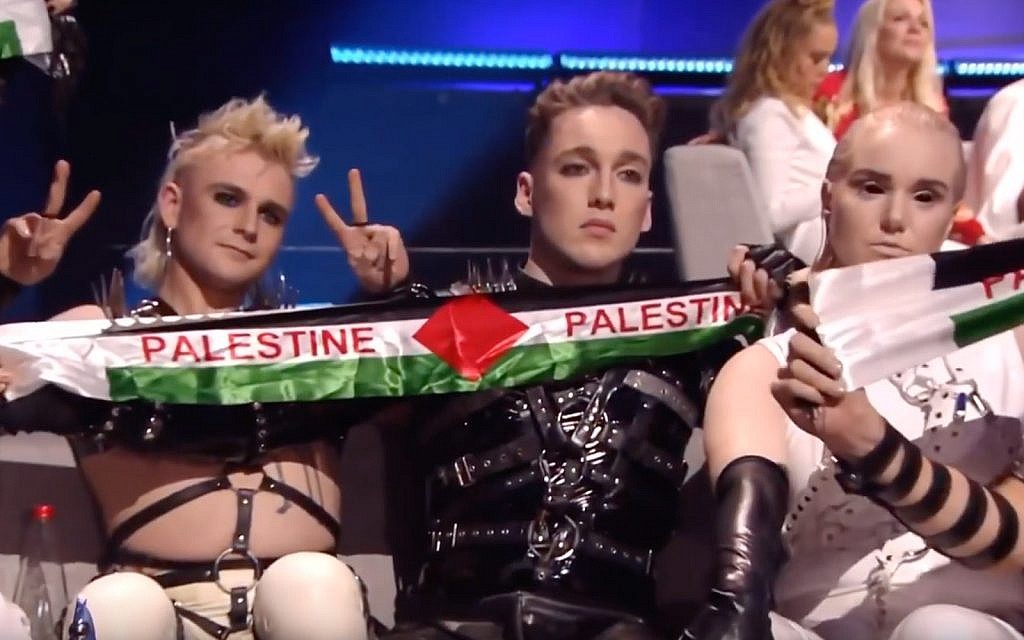Iceland Calls For Israel's Eurovision Expulsion Over War Crimes Allegations

Table of Contents
Iceland's Formal Request and Justification
Iceland's official statement calling for Israel's disqualification from the Eurovision Song Contest is a significant escalation in the ongoing debate surrounding the Israeli-Palestinian conflict. The statement directly links Israel's participation to alleged war crimes, arguing that allowing a country accused of such violations to participate is morally unacceptable and undermines the spirit of the competition.
Key arguments presented by Iceland include:
- Violation of International Human Rights Laws: Iceland alleges that Israel's actions in the occupied Palestinian territories constitute a systematic violation of international humanitarian law, including the Geneva Conventions.
- Targeting of Civilians: The statement cites specific instances where Israeli forces allegedly targeted Palestinian civilians, resulting in numerous deaths and injuries. These claims often reference reports from human rights organizations.
- Disproportionate Use of Force: Iceland highlights instances where the use of force by Israeli forces was allegedly disproportionate to the threat posed, resulting in excessive civilian casualties.
- Siege of Gaza: The ongoing blockade of Gaza and its impact on the civilian population are also mentioned as significant factors contributing to the call for expulsion.
Iceland's justification relies heavily on reports from organizations like Human Rights Watch and Amnesty International, which have documented alleged human rights violations committed by Israeli forces. The legal frameworks cited include the Geneva Conventions and international customary law.
Israel's Response and Counterarguments
Israel has strongly rejected Iceland's call for expulsion, characterizing it as politically motivated and an attempt to unfairly target Israel on a global stage. The Israeli government's response has emphasized several points:
- Self-Defense: Israel argues that its actions are primarily aimed at defending its citizens from attacks by armed groups.
- Proportionality of Response: Israel maintains that its responses are proportionate to the threats faced and are designed to minimize civilian casualties.
- Legitimate Security Concerns: The Israeli government highlights ongoing security threats and emphasizes its right to defend itself against attacks.
- Rejection of Bias: Israel has accused Iceland and other critics of bias and selective condemnation, arguing that other countries with comparable human rights records are not similarly targeted.
Israel has received support from various countries who view Iceland's actions as an inappropriate attempt to politicize the Eurovision Song Contest.
The Eurovision Song Contest's Response and Potential Actions
The European Broadcasting Union (EBU), which organizes the Eurovision Song Contest, has yet to issue a definitive response to Iceland's demand. The potential consequences of removing Israel are significant:
- Precedent Setting: Expelling a country based on political considerations could set a dangerous precedent, potentially opening the door for future boycotts and political maneuvering within the competition.
- Legal Challenges: Removing Israel could face legal challenges from the Israeli government or other participating countries.
- Political Fallout: Such a decision would undoubtedly intensify the political controversy surrounding the contest and could damage its reputation as a non-political event.
The EBU faces a difficult decision, balancing the principles of neutrality with the increasing pressure to address human rights concerns.
International Reactions and Public Opinion
The call for Israel's expulsion has elicited a mixed response from other participating countries and international organizations. Some countries have expressed support for Iceland's stance, highlighting the importance of addressing human rights violations. Others have condemned the move, emphasizing the importance of maintaining the apolitical nature of the competition.
- Human Rights Organizations' Statements: Organizations like Human Rights Watch and Amnesty International have issued statements calling for accountability for alleged human rights violations in the occupied Palestinian territories. However, their direct involvement in calling for Eurovision expulsion is not uniform.
- Public Opinion and Social Media: Social media has played a crucial role in amplifying the debate, with strong opinions expressed on both sides. Hashtags such as #Eurovision and #IsraelPalestine have been widely used to express support and opposition.
The Role of Social Media and Public Pressure
Social media has become a significant battleground in this controversy. Hashtags related to the issue have trended globally, shaping public discourse and putting pressure on both the EBU and participating countries. The rapid spread of information and opinions on social media has undeniably amplified public pressure on the Eurovision organizers to take a stance.
Conclusion
Iceland's call for Israel's Eurovision expulsion represents a significant escalation in the ongoing debate surrounding the Israeli-Palestinian conflict. The arguments presented by Iceland, based on alleged war crimes and violations of international law, are countered by Israel's claims of self-defense and proportionality. The EBU faces a challenging decision with far-reaching implications for the future of the Eurovision Song Contest and the broader intersection of politics and international events. The future likely holds further political responses and potential decisions by the Eurovision organizers. Staying informed about the ongoing developments and engaging in respectful discussion about the complex issues at the heart of this debate is crucial to understanding the ramifications of Israel's participation in Eurovision, and potential future expulsions.

Featured Posts
-
 14 Major Walmart Great Value Brand Recalls A Comprehensive List
May 14, 2025
14 Major Walmart Great Value Brand Recalls A Comprehensive List
May 14, 2025 -
 Wta 250 Austin No 3 Seed Stearns Eliminated
May 14, 2025
Wta 250 Austin No 3 Seed Stearns Eliminated
May 14, 2025 -
 Friday 7 Pm Et Your Daily Dose Of Top Company News Highlights
May 14, 2025
Friday 7 Pm Et Your Daily Dose Of Top Company News Highlights
May 14, 2025 -
 24 Revenue Growth Klarnas Key Us Ipo Filing Detail
May 14, 2025
24 Revenue Growth Klarnas Key Us Ipo Filing Detail
May 14, 2025 -
 Sanremo Marzia Taruffi Presenta Il Destino Del Primo Figlio Il 12 Aprile
May 14, 2025
Sanremo Marzia Taruffi Presenta Il Destino Del Primo Figlio Il 12 Aprile
May 14, 2025
